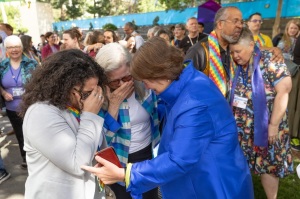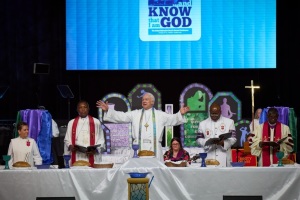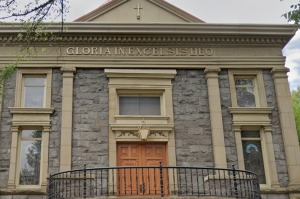Mexican Drug Dealer Turned Evangelist: I Saw Satan in the Drugs
There are three ways to join the drug cartels – by choice, by force, or in spirit. Thousands freely choose to work for the half dozen or so major drug cartels in Mexico and for the hundreds of smaller, independent drug gangs because it's their only chance to get rich – or simply make a living. Many others are recruited at the point of a gun, knowing that to refuse is to die.
But tens of thousands, on both sides of the border, join up in spirit, emulating the way the narcos dress, speak, party – and flout the law. They dance to the same music, deck themselves out in the same flashy bling, and speed wildly around in the same oversized rides they've seen in the narco movies.
The low-budget action films, hugely popular among young Hispanics in Latin America and the U.S., romanticize Mexican mafiosos as fabulously wealthy, rebel outlaws bursting with sexy machismo who live short, dangerously thrilling lives of grandiose excess until slain in an inevitable hail of bullets.
The realty is grimmer and much less glamorous, though equally deadly, according to two former cartel foot soldiers. Their names have been changed at their request.
Celestiano Delacruz was 20 years old and barely eking out a living on the lean streets of Matamoros, Mexico, just across the border from Brownsville, Texas. He doesn't speak much English, so he tells his story through a translator.
"I'd sell newspapers, Chiclets gum, candies, anything to get by. I wasn't doing too good," he said.
A couple of middle-aged, well-dressed cartel members approached him one day and offered him a job selling drugs. He'd seen them around and knew who they were. They knew who he was, too, and made him the offer because being a street hawker gave him the perfect cover for dealing drugs.
"I was really glad, thought it was a great opportunity. Of course I accepted. I felt it was my lucky day."
He began selling cocaine in Matamoros cantinas and across the river in Brownsville clubs and bars.
"I don't know how much I made, but it was a lot, more than I needed. After a year and a half, I got busted in Brownsville and went to jail, but my padrino (cartel godfather) got me out. He knew some powerful politicians in Texas."
After that, he was more careful. He continued dealing coke for another six or seven years, on both sides of the border, while moving up through the organization's ranks.
"I lived real well, had everything I wanted, a nice house, nice truck, a good wife, and lots of women."
At first, it was a great adventure, like living inside a narco action movie.
"It was fun, it was a challenge. I was looking for respect, and I found it. I wanted to be outstanding among my compadres, and I was. They looked up to me. I made a name for myself."
Shootouts came with the territory, and he may have killed somebody, but isn't sure, "everybody is shooting and you don't stick around to find out who died."
He became addicted to cocaine, got arrested for dealing drugs in Matamoros and spent eight years in a Mexican prison, which was not, he said, much fun.
Upon his release he went back to work for the cartel, but had become such a heavy coke user he was snorting more of the merchandise than he was selling. It didn't take long for his boss to catch on.
"One day, five guys grabbed me from a bar and took me out into the country to this ranch. I knew the guys, I'd worked with them, and thought they were my friends, but they started torturing me and said they were going to cut off my head with a chainsaw."
He said he hadn't prayed in years, even though his father had been a pastor and ministers had explained the gospel to him in prison.
"I started praying then, like I'd never prayed before. I asked God to protect my wife and my children because I knew I was going to die."
One of his torturers picked up the chainsaw and began pulling the starter rope. He pulled and pulled, cursed and cursed, but the engine wouldn't catch. Celestiano Delacruz kept praying. All the torturers took a turn at trying to start the saw, with no luck. Finally, they gave up.
"They punched and kicked me until their faces turned red and they were dripping sweat. One of them, my best compadre, he said they'd all get in trouble if the boss found out they hadn't cut off my head."
So, they decided to tell the boss they'd done it, and would let Delacruz go if he gave them the names of other dealers who'd been stealing drugs from the cartel. They said he'd have to leave Mexico and never come back. If they ever saw him again, they'd show no mercy.
They dumped him near the border and he fled to Texas, terrified they'd come looking for him to finish the job. He hid out, and eventually fear drove him to begin reading the Bible.
"I started looking for God. I was hungry for Him. A pastor prayed for me, and I felt the power of God coming into my life. I stopped doing drugs and got a job. Pretty soon I got saved, got baptized and started evangelizing everybody.
"It went on like that for months, then the devil came after me. I got back on coke, worse than before. I was so filled with rage and so coked up and paranoid I tried to kill my wife because I got jealous imagining her with other men. I stayed on drugs for about six months."
It was like one long, horrible nightmare, he said.
"I saw Satan himself in the drugs. It was really bad and crazy. The devil had a real strong hold on me."
Then someone invited him to church.
"I rededicated my life to God, quit drugs for good, and have been serving the Lord ever since – for about the last eight years. I used to run with gangs, now I run with Jesus. I used to be a drug dealer, now I'm a pastor for Christ."
Delacruz holds church services and Bible studies on his patio in the rough, rural neighborhood where he lives near the border. It's an area plagued by poverty and crime, where thousands who've entered the U.S. illegally have settled after fleeing the violence in Mexico.
"There are usually 20 to 30 people who come to the services from the neighborhood, a lot of them are hardcore people, tattooed gangbanger kids, on drugs – maybe dealing drugs, 18- and 19-years-old – they come hang out and listen to the Bible studies."
He said he has led a number of cartel members and drug dealers to Christ.
"A lot of Zetas have given their lives to the Lord. One even called me to pray for his top boss who was dying," Delacruz said.
The Zetas are considered the most brutal and violent of the cartels. From their beginnings in Tamaulipas state adjacent to Texas, they have spread throughout Mexico, and into the U.S. The FBI estimates the Zetas have tentacles reaching into at least 230 American cities, perhaps a thousand. The Zetas are locked in a bloody feud with the Gulf cartel for control of the drug business and other criminal rackets in several Mexican towns along the Texas border. Gruesome murders take place there on a regular basis.
Though the major media continue to report that drug violence hasn't yet spilled over the border into Texas, Delacruz disagrees, and so do others in the drug business, like Juan Abrego.
Abrego, who isn't acquainted with Delacruz, said he knows the Zetas are carrying on their deadly trade in Texas.
"I should know," he said "I worked for them, as a bodyguard and enforcer, a pistolero. My job was to guard the merchandise and the bosses – and to take a bullet for them, to die for them, if I had to. I got the job because I had military training."
He tells his story in a soft, quiet voice. He's not boasting or making up a tall tale. He looks his listener in the eye with a steady, honest gaze, giving the impression he needs to confess. He said he believes in Jesus and only took the job because he was unemployed and strung out on crack cocaine. He craved large daily doses of the expensive stimulant, and saw working for the drug gang as a way to insure an affordable, consistent supply.
"The Zetas want to control the entire border, la frontera. Not just to cross their own stuff without trouble, but to tax everybody else who wants to smuggle anything across. They control the coke business here in the Rio Grande Valley, and it's very big."
He explained he wasn't employed directly by the Zetas, but that they supplied the coke to the gang he worked for, and his gang boss was related to one of the Zetas. The Zetas and other cartels, he said, are generally wholesalers who supply drugs to a great many independent gangs throughout Mexico and the U.S., which serve as retailers.
Abrego said he hadn't been working for the gang very long when a gunfight broke out and he witnessed up close the severe damage a single bullet from an AK-47 can do to the human body.
The sight of his friend's mangled, bloody, ruined knee took all the fun out of the job. The wounded man couldn't be taken to a hospital or they'd all get busted, so they contacted one of the cartel's doctors in Mexico who made a cross-border emergency house call in exchange for a large sum of money.
"After that, I quit, and moved to a different town to get away from all that. I knew if I didn't get caught by cops and spend a long time in prison for killing somebody, I was going to get killed myself. I was going down, any way you look at it.
"When you get locked up, it's like your whole family gets locked up. They suffer right along with you, because of what you've done. I'd already been there. I didn't want to go back."
This article is the third in a four-part series on the effects of drug violence on Christianity along the Mexico-U.S. border. For part one, click here. For part two, click here.




























